Aérospatiale Alouette III
| SA 316 / SA 319 Alouette III | |
|---|---|
 | |
| An Alouette III over Switzerland belonging to the Netherlands Air Force | |
| Role | Light utility helicopter |
| National origin | France |
| Manufacturer | Sud Aviation Aérospatiale |
| First flight | 28 February 1959 |
| Introduction | 1960 |
| Status | In service |
| Primary users | French Armed Forces Rhodesian Air Force Indian Armed Forces[N 1] |
| Produced | 1961-1985 (HAL Chetak still in production) |
| Number built | 2,000+ |
| Developed from | Aérospatiale Alouette II |
| Variants | IAR 316 |
The Aérospatiale Alouette III (French pronunciation: [alwɛt], Lark) is a single-engine, light utility helicopter developed by Sud Aviation. It was manufactured by Aérospatiale of France, and under license by Hindustan Aeronautics in India as Hal Chetak, by Industria Aeronautică Română in Romania as IAR 316 and F+W Emmen (de) in Switzerland.
The Alouette III is the successor to the Alouette II, being larger and having more seating.
Development
The first version of the Alouette III, the SE 3160 prototype, first flew on 28 February 1959. The SA 316A (SE 3160) entered production in 1961 and remained in production until 1968, when it was replaced by the SA 316B. The last and 1437th Alouette III left the Marignane assembly lines in 1979, when the main production line in France was closed down. The last Alouette III from Aérospatiale was delivered in 1985.
Over 500 units were manufactured under licence in Romania, India, and Switzerland. Hindustan Aeronautics Limited (HAL) obtained a license to build Alouette IIIs as the HAL Chetak in India. Over 300 units were produced by HAL as it continued to independently update and indigence the helicopter over the years, and a variant is still in production though in diminishing volumes. Versions of the Alouette III were also either license-built or assembles by IAR in Romania (as the IAR 316), F+W Emmen (de) in Switzerland, and by Fokker and Lichtwerk in the Netherlands.
When used as an aerial ambulance, the Alouette III can accommodate a pilot, two medical attendants and two stretcher patients.
Variants
- SA 316A : the first production version. Original designation SE 3160.
- SA 316B : powered by a 425 kW (570 shp) Turboméca Artouste IIIB turboshaft engine, with strengthened main and tail rotor for greater performance. The SA 316B was built under licence in India as the HAL Chetak, and again under license in Romania as the IAR 316.
- HAL Chetak : Indian production version of the SA 316B.
- HAL Chetan:HAL/Turbomecca TM 333-2M2 Shakti engine.
- IAR 316 : Romanian production version of the SA 316B.
- F+W Alouette IIIS : 60 SA-316B license-assembled in Switzerland by F+W Emmen (de) between 1970 and 1974.
- The SA 319B was a direct development of the SA 316B, it was powered with a 649 kW (870 shp) Turbomeca Astazou XIV turbo shaft engine, but it was derated to 447 kW (660 hp).
- The SA 316C was powered by a Turbomeca Artouste IIID turboshaft engine. The SA 316C was only built in small numbers.
- G-Car and K-Car : Helicopter gunship versions for the Rhodesian Air Force.[2] The G-Car was armed with two side-mounted Browning .303 or a single 7.62mm MAG machine guns. The K-Car was armed with a 20 mm MG 151 cannon, fitted inside the cabin, firing from the port side of the helicopter.
- SA.3164 Alouette-Canon: Modified in 1964 as a gunship version armed with a 20mm gun in the nose and external hardpoints for missiles mounted on each side of the fuselage. Only one prototype was built.[3]
- IAR 317 Airfox: A Romanian helicopter gunship project based on the IAR 316. Only three prototypes were ever built.
- Atlas XH-1 Alpha: South African two-seat attack helicopter project. It was used in the development of the Denel Rooivalk.
Specifications (SA 316B)
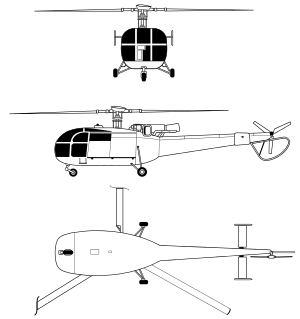
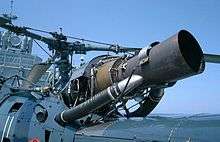
Data from Jane's All The World's Aircraft 1976-77 [4]
General characteristics
- Crew: 2
- Capacity: 5 passengers
- Length: 10.03 m (32 ft 10¾ in)
- Main rotor diameter: 11.02 m (36 ft 1¾ in)
- Height: 3.00 m (9 ft 10 in)
- Main rotor area: 95.38 m2 (1026 ft2)
- Empty weight: 1,143 kg (2,520 lb)
- Gross weight: 2,200 kg (4,850 lb)
- Powerplant: 1 × Turbomeca Artouste IIIB turboshaft, 649 kW (870 shp) derated to 425 kW (570 hp)
Performance
- Maximum speed: 210 km/h (130[5] mph)
- Cruising speed: 185 km/h (115 mph)
- Range: 540 km (335 miles)
- Service ceiling: 3,200 m (10,500 ft)
- Rate of climb: 4.3 m/s (850 ft/min)
Operational history
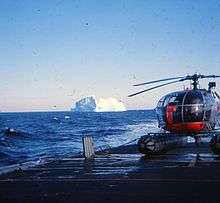
Argentina
The Argentine Naval Aviation purchased 14 helicopters. One SA316B was on board the ARA General Belgrano when she was sunk by the HMS Conqueror's torpedoes during the Falklands War with Great Britain in 1982 and a second one played an important role during the Invasion of South Georgia. On 2 December 2010, the last example was retired at a ceremony held at BAN Comandante Espora, Bahía Blanca.[6][7]
Australia
From April 1964 to 1967, three machines were delivered from France for local assembly in Australia. These were used by the Royal Australian Air Force (RAAF) at the Woomera Rocket Range for light passenger transport and the recovery of missile parts after test launches at the Range.
Belgium
Marine / Air Force : 3 × SA.316B
Chile
The Chilean Navy ordered a batch of ten SA-319Bs in 1977. The aircraft were delivered by the middle of 1978 and made operational just before the peak of the Beagle conflict with Argentina, making the first real organic maritime ship borne tactical helicopter operated by Chile's naval forces. They were equipped with a radar and armed with rockets, guns, depth charges and a single light anti-submarine torpedo. A sole SA-319B was damaged during the frantic training period in 1978, but it was placed in storage and repaired back to airworthy condition later. All ten Chilean Navy SA-319Bs were operational and in excellent conditions at the end of the eighties, when they were replaced by SA532 Super Puma helicopters, and were bought by civilian operators.
Denmark
Eight machines were delivered to the Royal Danish Navy from 1962 to 1967. They were primarily tasked with SAR and reconnaissance in support of the navy's Arctic patrol ships. In 1982, they were replaced by the Westland Lynx[8]
France

The Alouette III entered service with the French Armed forces in 1960. The French Army ordered 50 Alouette IIIs in June 1961.
In June 1960, an Alouette III carrying seven people made take-offs and landings on Mont Blanc in the French Alps at an altitude of 4,810 meters (15,780 feet), an unprecedented altitude for such activities by a helicopter.[9] The same helicopter again demonstrated the type's extraordinary performance in November 1960 by making take-offs and landings with a crew of two and a payload of 250 kg (551 lbs) in the Himalayas at an altitude of 6,004 meters (19,698 feet).[9]
In June 2004, the Alouette III was retired from the French Air Force after 32 years of successful service, being replaced by the Eurocopter EC 355 Ecureuil 2.
The French Navy still uses the Alouette III for Search and Rescue and Logistics missions.
Ireland
The Irish Air Corps operated Alouette IIIs between 1963 and 2007; for much of this period they were the only helicopters in the Corps. The first two were delivered in 1963, a third in 1964 and five further aircraft between 1972 and 1974. At Baldonnel Aerodrome on 21 September 2007, the Alouette III was retired from the Irish Air Corps. During 44 years of successful service, the Irish Alouette III fleet amassed over 77,000 flying hours. As well as routine military missions, the aircraft undertook some 1,717 search-and-rescue missions, saving 542 lives and flew a further 2,882 air ambulance flights. The oldest of the Alouettes, 195, is kept in 'rotors running' condition for the Air Corps Museum.[10]
India
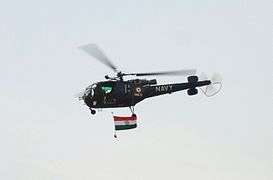
Hindustan Aeronautics Limited built over 300 units of the helicopter under licence as the HAL Chetak. They were primarily in service with the Indian Armed Forces in training, transport, CASEVAC (Casualty Evacuation), communications and liaison roles. The Chetak is being replaced by HAL Dhruv in the armed forces. An option to re-engine the HAL Chetak with the Turbomeca TM 333-2B engine for high-altitude operations in the Himalayas was considered, but not pursued.
In 1986, the Government constituted the Army's Aviation Corps and most Chetak operating in AOP Squadrons were transferred from the Air Force on 1 November 1986. The Air Force continues to fly armed Chetaks in the anti-tank role as well as for CASEVAC and general duties.
HAL also exported Chetak helicopters to Namibia and Suriname. India has also donated used Chetak helicopters to other countries such as Bangladesh and Nepal.
Pakistan
Pakistan purchased 35 Alouette III helicopters and used them in the Indo-Pakistani War of 1971, mainly for liaison and VIP-transport. Two Alouette IIIs of the Pakistan Air Force (PAF) were shot down during the war.[11]
Portugal

Portugal was the first country to use the Alouette III in combat. In 1963, during the Overseas Wars in Angola, Mozambique and Portuguese Guinea, Portugal began using Alouette IIIs in combat, mainly in air assault and medevac operations, where it proved its qualities. Besides the basic transport version (code named canibal, plural canibais), Portugal used a special version of the Alouette III with a MG 151 20 mm autocannon mounted in the rear in order to fire from the left side door; it was designated helicanhão (heli-cannon) and code named lobo mau (big bad wolf).
In the Overseas Wars, the Portuguese usually launched air assaults with groups of six or seven Alouette III: five or six canibais - each usually carrying five paratropers or commandos - and a lobo mau heli-cannon. The Portuguese practice was for the troops to jump from the canibais when the helicopters were hovering two-three meters above the ground - famous images of these disembarking troops became an iconic image of the war. The landing of the troops was covered by the lobo mau. While the troops performed the ground assault, the canibais moved away from the combat zone, while the lobo mau stayed to provide fire support, destroying enemy resistance and concentration points with the fire from its 20 mm autocannon. Once the ground combat had finished, the canibais returned; firstly to collect the wounded, then the rest of the troops.
At present, the Portuguese Air Force maintains a number of Alouette IIIs in service, mainly for training and SAR. They also equip the aerobatic team Rotores de Portugal.
Rhodesia
At its peak, No. 7 Squadron, Rhodesian Air Force, operated 34 Allouette III, along with a smaller number of Allouette II, in the troop transport, casevac and battlefield support roles. They played a major part in the Rhodesian Forces' "Fire Force" doctrine, both deploying ground troops, acting as observation and command post and providing mobile fire support as gunships.[12]
South Africa
The Alouette III served for over 44 years and flew more than 346,000 hours in the South African Air Force (SAAF), particularly during counterstrike operations in Angola. The aircraft was officially withdrawn from SAAF service at AFB Swartkop near Pretoria in June, 2006.[13]
In early 2013, an interim court order blocked the proposed sale of South Africa's retired Alouette fleet to the Zimbabwean Air Force.[14]
Suriname
In 1999, the Surinam Air Force retired and sold its two Alouette III helicopters from active service. They have been on duty since 1986 in this small South American country bought from Portugal. Three new HAL Chetak Indian version Alouette III's were delivered to the Suriname Air Force on 13 March 2015, while the pilots and technicians of the Surinam Air Force were under training in Bangalore, India for some time.[15][16][17]
Switzerland
Swiss air force purchased nine Alouette III in 1964, then 15 more in 1966. 60 SA-316B (F+W Alouette IIIS) were license-assembled by {{{1}}} in Switzerland. In 2004, the Swiss Armed Forces announced the retirement of the Alouette III from front-line service by 2006 (36 Alouette III) and entirely by 2010, 10 of them have been given to Pakistan for rescue duty. They have been replaced by 20 Eurocopter EC635.
Venezuela
The Venezuelan Air Force retired its Alouette IIIs in the late 1990s.
Operators
Current military operators
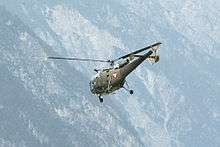
_prepares_to_land_onto_the_flight_deck_of_USS_Stethem_(DDG_63).jpg)
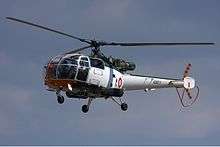

Former military operators
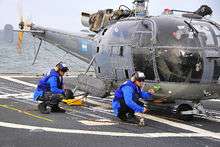
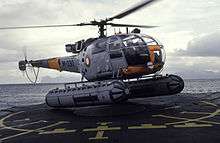

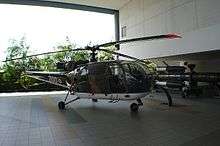
See also
- Related development
- Related lists
References
Notes
Citations
- 1 2 3 "SIPRI arms transfer database". Stockholm International Peace Research Institute. 19 March 2012. Retrieved 21 November 2013.
- ↑ Wood, J.R.T (2009). Counter-strike From the Sky: The Rhodesian All-arms Fireforce in the War in the Bush 1974–1980. 30° South Publishers. ISBN 1-920143-33-5.
- ↑ "SA 3164 "Alouette Canon" - Stingray's List of Rotorcraft". google.com. Retrieved 3 July 2015.
- ↑ Taylor 1976, p. 39.
- ↑ at sea level
- ↑ Adiós Alouette Archived 8 December 2010 at the Wayback Machine.
- ↑ "Argentine Navy's Final Alouette III Retired". Air Forces Monthly. Key Publishing Ltd (275): 24. March 2011. ISSN 0955-7091.
- ↑ Schrøder, Hans (1991). "Royal Danish Airforce". Ed. Kay S. Nielsen. Tøjhusmuseet, 1991, p. 1–64. ISBN 87-89022-24-6.
- 1 2 Donald, p. 22.
- ↑ "New Wings for the Irish Air Corps". airsceneuk.org.uk. Retrieved 3 July 2015.
- ↑ "Archived copy". Archived from the original on 3 May 2006. Retrieved 2006-05-28.
- ↑ "Rhodesian Air Force – No 7 Squadron". Rhodesian Army Association. Retrieved 14 December 2013.
- ↑ Dean Wingrin. "The South African Air Force". saairforce.co.za. Retrieved 3 July 2015.
- ↑ SABC: Zim helicopter interdict confirmed, 2/2/2013
- ↑ "2014 August 17 - Times of Suriname – grootste landelijke dagblad van Suriname". Times of Suriname - grootste landelijke dagblad van Suriname. Retrieved 3 July 2015.
- 1 2 "Starnieuws - Eerste Chetak helikopter in elkaar gezet op basis Luchtmacht". starnieuws.com. Retrieved 3 July 2015.
- ↑ "Starnieuws - Luchtmacht neemt Chetak-helikopters in gebruik". starnieuws.com. Retrieved 3 July 2015.
- 1 2 3 4 5 6 7 8 9 10 11 12 13 14 15 16 17 18 19 20 21 22 23 24 25 26 27 28 29 30 31 "World Air Forces 2013" (PDF). Flightglobal Insight. 2013. Retrieved 30 March 2013.
- ↑ "cessna - iai kfir - bell - 1996 - 1862 - Flight Archive". flightglobal.com. Retrieved 3 July 2015.
- ↑ "World Air Forces 1975". flightglobal.com. p. 291. Retrieved 23 March 2013.
- ↑ "Comando de Aviacion Naval Argentina Alouette III". Retrieved 30 March 2013.
- ↑ "World Air Forces 1983". flightglobal.com. p. 327. Retrieved 30 March 2013.
- ↑ "World Air Forces 1987". flightglobal.com. p. 44. Retrieved 30 March 2013.
- ↑ "World Air Forces 1975". flightglobal.com. p. 293. Retrieved 30 March 2013.
- ↑ "Armada de Chile Alouette III". Retrieved 30 March 2013.
- ↑ "Kongelige Danske Marine Alouette III". Retrieved 30 March 2013.
- ↑ "World Air Forces 1987". flightglobal.com. p. 50. Retrieved 30 March 2013.
- ↑ "Armada Ecuatoriana Alouette III". Retrieved 30 March 2013.
- ↑ "Fuerza Aerea Salvadoreña Alouette III". Retrieved 30 March 2013.
- ↑ "Armée de L'air SA 316". Retrieved 16 April 2013.
- ↑ "World Air Forces 1983". flightglobal.com. p. 338. Retrieved 30 March 2013.
- ↑ "Securite Civile Alouette III". Retrieved 30 March 2013.
- ↑ "World Air Forces 1987". flightglobal.com. p. 59. Retrieved 30 March 2013.
- ↑ "World Air Forces 1983 pg .346". flightglobal.com. Retrieved 30 March 2013.
- ↑ "Royal Hong Kong Aux. Air Force Alouette III". Retrieved 30 March 2013.
- ↑ "World Air Forces 1983". flightglobal.com. p. 352. Retrieved 30 March 2013.
- ↑ "Aer Chór na hÉireann Alouette III". Retrieved 30 March 2013.
- ↑ "World Air Forces 1983". flightglobal.com. p. 358. Retrieved 30 March 2013.
- ↑ "World Air Forces 1983". flightglobal.com. p. 359. Retrieved 30 March 2013.
- 1 2 3 "World Air Forces 1987". flightglobal.com. p. 68. Retrieved 30 March 2013.
- ↑ "World Air Forces 1983". flightglobal.com. p. 360. Retrieved 30 March 2013.
- 1 2 "World Air Forces 1987". flightglobal.com. p. 72. Retrieved 30 March 2013.
- 1 2 "World Air Forces 1987". flightglobal.com. p. 73. Retrieved 30 March 2013.
- ↑ "Alouette III helicopter". defensie.nl. Archived from the original on 19 April 2014. Retrieved 23 May 2014.
- ↑ http://www.verticalmag.com/news/article/Bluebirds-last-flight
- ↑ "World Air Forces 1987". flightglobal.com. p. 74. Retrieved 30 March 2013.
- 1 2 3 "World Air Forces 1987". flightglobal.com. p. 77. Retrieved 30 March 2013.
- ↑ "World Air Forces 1971". flightglobal.com. p. 936. Retrieved 30 March 2013.
- ↑ "World Air Forces 1987". flightglobal.com. p. 80. Retrieved 30 March 2013.
- ↑ "World Air Forces 1975". flightglobal.com. p. 308. Retrieved 30 March 2013.
- ↑ "World Air Forces 1990". flightglobal.com. p. 68. Retrieved 30 March 2013.
- ↑ "Republic of Singapore Air Force Alouette III". Retrieved 30 March 2013.
- ↑ "Suid-Afrikaanse Lugmag Alouette III". Retrieved 30 March 2013.
- ↑ "Military Helicopter Market 1971". flightglobal.com. p. 581. Retrieved 3 April 2013.
- ↑ "Ejercito del aire Alouette III". Retrieved 30 March 2013.
- ↑ "Fuerzas Aeromóviles del Ejército de Tierra Alouette III". Retrieved 30 March 2013.
- ↑ "schweizer luftwaffe Alouette III". Retrieved 30 March 2013.
- ↑ "World Air Forces 1983". flightglobal.com. p. 379. Retrieved 30 March 2013.
- ↑ "Fuerza Aerea de Venezuela Alouette III". Retrieved 30 March 2013.
- ↑ "World Air Forces 1987". flightglobal.com. p. 67. Retrieved 30 March 2013.
- ↑ "World Air Forces 1987". flightglobal.com. p. 106. Retrieved 30 March 2013.
Bibliography
- Andrade, John (1982). Militair 1982. London: Aviation Press Limited. ISBN 0-907898-01-7.
- Hatch, Paul. "World's Air Forces". Flight International (5–11 December 1990): 35–81.
- Taylor, John W R. (editor) (1976). Jane's All The World's Aircraft 1976-77. London: Jane's Yearbooks. ISBN 0-354-00538-3.
- Donald, David, ed. The Complete Encyclopedia of World Aircraft. New York: Barnes & Noble Books, 1997. ISBN 0-7607-0592-5.
External links
| Wikimedia Commons has media related to Aérospatiale Alouette III. |
- Aérospatiale SA 316B/ VSV/ SA 319B Alouette III
- GlobalSecurity.org SA 316/SA 319 Alouette III
- Sud Aviation SA 316/319 Alouette III
- The Virtual Aviation Museum – Aérospatiale SE 3160 Alouette III
- Hindustan Aeronautics Limited – Chetak
- IAR-317 "Airfox" at Stingray's List of Rotorcraft